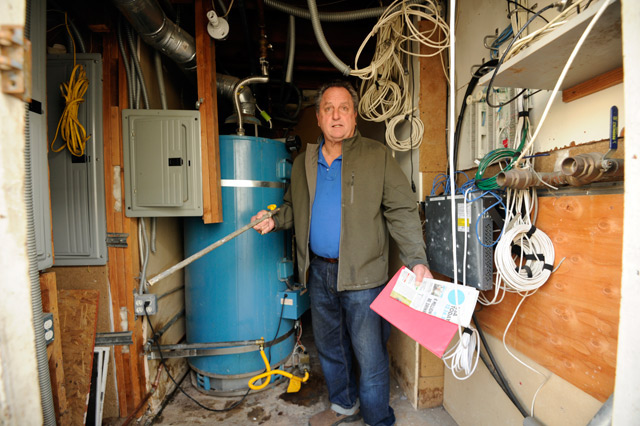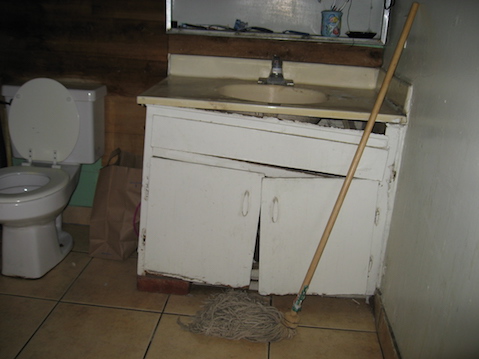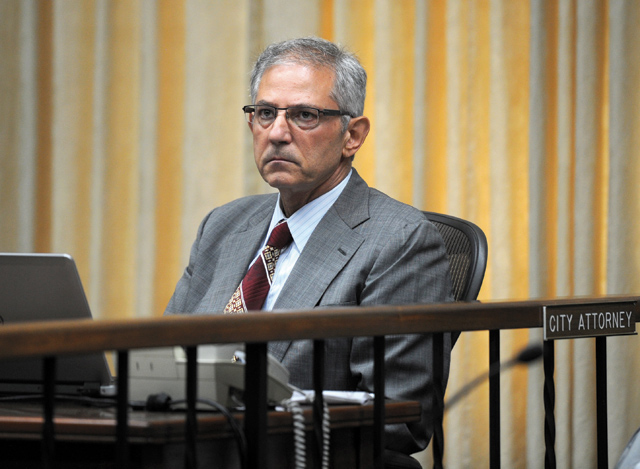City Attorney Demands $8.1 Million in Penalties from Dario Pini
Says Landlord Exposed Tenants to 'Hazardous, Horrific, and Unconscionable Living Conditions'

Two days after posting 3,200 notices of code violations against landlord Dario Pini, Santa Barbara City Attorney Ariel Calonne dropped the legal equivalent of both a safe and a piano upon the head of Santa Barbara’s biggest, best known, and most controversial landlord. With legal backup provided by District Attorney Joyce Dudley, Calonne filed an “unfair competition” lawsuit against Pini, alleging wholesale violation of city health and safety codes over a 30-year period, demanding $8.1 million in penalties, and seeking to place Pini’s properties into receiverships so that the necessary repairs can be done. In an interview, Calonne said City Hall had never initiated such an action before. “The definition of insanity is doing the same thing time and time and expecting a different result. We have been trying to get Mr. Pini to comply with basic health and safety codes for 30 years, and we have yet to achieve those results,” Calonne said.
In legal papers filed Thursday morning, Calonne charged that Pini’s tenants had been “exposed to hazardous, horrific and unconscionable living conditions, including but not limited to, rodent infestations, insect infestations, severe mold, unpermitted and hazardous electric wiring, inoperable heating, unsanitary bathrooms, missing windows, plumbing leaks, structures so poorly maintained that they are at risk of collapse, damaged floor supports, missing or inoperable smoke alarms, junk and debris creating fire hazards, unsafe stairways, inadequate ventilation, unpermitted and improperly installed water heaters and overcrowding.”

This action was taken pursuant to raids executed by city inspectors on 12 Pini properties and his own personal residence on the Riviera on December 6 and 7 accompanied by as many as 15 city police officers. Calonne described Pini’s personal residence as “literally, a rat’s nest of illegal construction, illegal storage, vermin infestation and dangerous conditions.”
Although Thursday’s legal filing targets 12 of Pini’s properties, Calonne said the action opens the door to seeking “receivership” for all of the properties owned by Pini within city limits. How many that is, Calonne, said he did not know, but Pini has estimated he has “thousands” of tenants. “Receivership” is a bland legal description for the process of seizing Pini’s properties and turning them over to a third party to manage and administer. Court-appointed “receivers” are empowered to collect rents that would otherwise go to the owner, and they can also incur debts to make the repairs needed to bring the properties up to legal snuff.
Pini’s attorney, Larry Powell, responded, “It’s a big lawsuit, but as I read, the pleadings are pretty thin; $8.1 million dollars is a big number, but when you get down to details, the allegations are pretty vague.” Powell added Pini has more than 100 properties within city limits, and the lawsuit focuses on only 12. Of those, Powell said, one is Pini’s personal residence and two are hotels that have been vacant for two years and that construction crews have been working on. “All this is predicated on the 3,000 notices of violations the city has posted, but I guarantee, as we go through these, you’ll find the vast majority have already been fixed.”

In previous interviews, Pini has complained that City Hall has been waging a legal vendetta against him. Pini is the son of Italian immigrants and rents primarily to low-income immigrants. Because of that, he’s said, his tenants tend to double and triple up without his consent and in violation of their lease agreements. Pini said overcrowding has grown worse in recent months as out-of-town property management companies have started aggressively buying up apartment complexes on the lower Westside and downtown. As these rentals are bought and improved, rents go up, and existing tenants are effectively displaced. These, Pini has claimed, move in with relatives who happen to be renting from him.
Pini stated in a recent interview he has a crew of 25-30 full-time workers maintaining and fixing his properties. He dismissed many of the 3,200 notices of violations against him as minor. The more serious issues, he insisted, he moves on as soon as he hears of them.
Over the years, Pini has stressed, he is one of the few landlords who rents to Mexican immigrants, suggesting that the criticisms of his management style are racially based. He has also suggested that some city building inspectors have a personal grudge against him and are hoping to settle old scores.
Regardless of motivation, Pini’s building code history with City Hall is both long and fraught. He’s been the focus of several multi-departmental enforcement actions and has served time in county jail as a result of one in the 1990s. Over the years, Pini’s properties — famously overcrowded — have been the target of numerous zoning and code enforcement actions. Typically, Pini responds, work gets done — sometimes without permit — improvements are made, and the problems resurfrace. City Attorney Calonne said Pini’s substandard business practices victimize not only his tenants, but his neighbors and all the landlords and property management companies who comply with city laws.
Since the December inspection sweeps, Pini said he’s been seeking an audience with Calonne to hash out a new understanding but has been unsuccessful in this pursuit.


